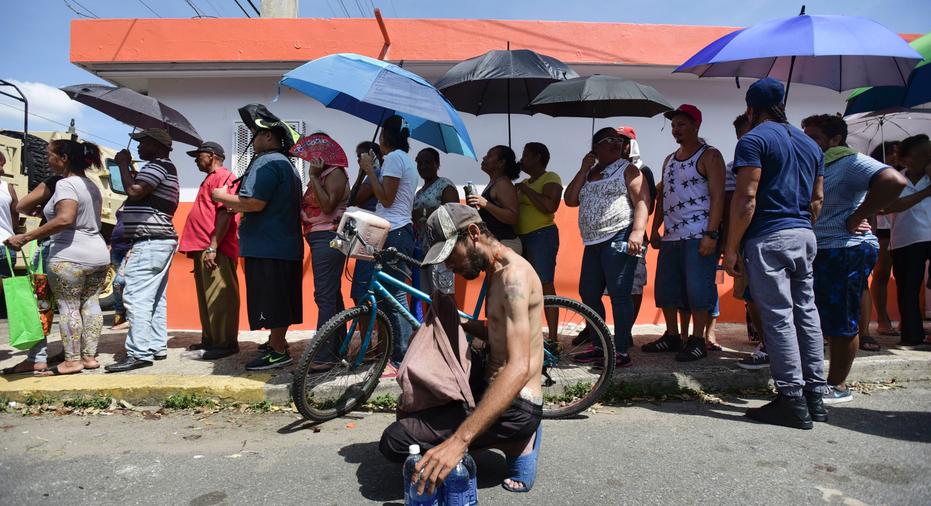Ravaged Puerto Rico: Here's how to help after hurricane

NEW YORK – Hurricane Maria has devastated Puerto Rico, destroying buildings leaving its more than 3.4 million residents largely without power. Food and drinking water are also difficult to come by, and the recovery will be long, difficult and expensive.
While the urge to donate clothes and other supplies is natural, money is the best way to contribute during times of disaster, charities and philanthropy experts say. That's not to say there's never a time and place for supplies. Diapers, for example, are often requested. And donating directly through a website gets money to a charity faster than a text donation, even though the text might seem easier.
Here's how to make sure you are giving in a way that matters the most.
___
GIVE TO ESTABLISHED CHARITIES
GuideStar's website has a database that lets you vet charities . You can find information on a charity's expenses, assets and revenue, as well as its programs. Stacy Palmer, editor of The Chronicle of Philanthropy, also suggests looking at a charity's website for information on how it will use donations. And look through local news reports for information on a charity's work, or contact the local United Way (in this case, Puerto Rico's). It's up to you whether to go with a local charity that might know the area better, or a national charity that has wider reach.
___
TEXTING TO GIVE?
It might be tempting to make a donation through a text and have the phone company charge it on your phone bill. It's easy, and it might feel as though it's the quickest way to get money to a charity.
But Palmer says that's not the case, as charities have to wait for the phone companies to release the money.
The quickest way to give is to go to the charity's website and donate directly, using a credit or debit card. That said, relief agencies will need money beyond first few days or even weeks, so if the ease of text donations appeals to you, tap away. To donate $10 to the Red Cross via text, send a text message saying "REDCROSS" to the number 90999.
Apple users in the U.S. can also donate to the American Red Cross through the company's iTunes and app stores to help people affected by Hurricane Maria and the earthquake in Mexico. Amounts range from $5 to $200, and you can't use store credit. The donations will be split equally between the two disasters.
On Google, searching for terms such as "Hurricane Maria" will let you donate directly in the search results. Just scroll down and you'll find an option to give $5, $25 or $50 to the Center for Disaster Philanthropy .
___
TIMING
Donations often pour in immediately after disaster strikes but peter out during the long recovery process. While there are a lot of immediate needs, Palmer says, charities are going to need support for the long haul.
Consider saving some of your money so you can donate again in a few weeks or months. Better yet, set up a recurring donation to support your chosen charity over time.
Some charities will say when they have raised enough for a particular disaster and use any extra money for their general fund, Palmer says. This isn't bad.
"One of the things this disaster shows is that it's important to have resilience," she says. "It's smart to just give and say that it can be used wherever it's most needed."
___
CROWDFUNDING
Group fundraising services such as GoFundMe let people raise money for friends, families, neighbors or themselves — as well as for charity. As always, do your homework before giving to a stranger or cause online.
GoFundMe has a special page for Hurricane Maria pleas for charities, individuals and families. GlobalGiving , a crowdfunding site for charities, is trying to raise $2 million for local relief and recovery efforts.
Remember that donations are tax-deductible only if they go to a registered nonprofit or charity. Otherwise, they are generally considered gifts.
___
HOLD OFF ON MATERIAL DONATIONS
Donating food, clothing and household items can complicate and even hinder relief efforts, experts say. After Superstorm Sandy in 2012, for example, there were reports of relief agencies not knowing what to do with the piles of clothing and other unsolicited items pouring in.
The U.S. Center for Disaster Information says such donations "require transportation — which is expensive and logistically complicated — and a pre-identified recipient on the ground who will receive the shipment, pay customs and other fees, sort and distribute the items."
Unsolicited goods, the agency says , are "never required in early stages of response, and they compete with priority relief items for transportation and storage."
___
LOCAL HELP
Puerto Rico's first lady, Beatriz Rossello, has launched an emergency fund with help from private companies. United for Puerto Rico (Unidos Por Puerto Rico) lets you donate through PayPal or directly to its bank account.



















